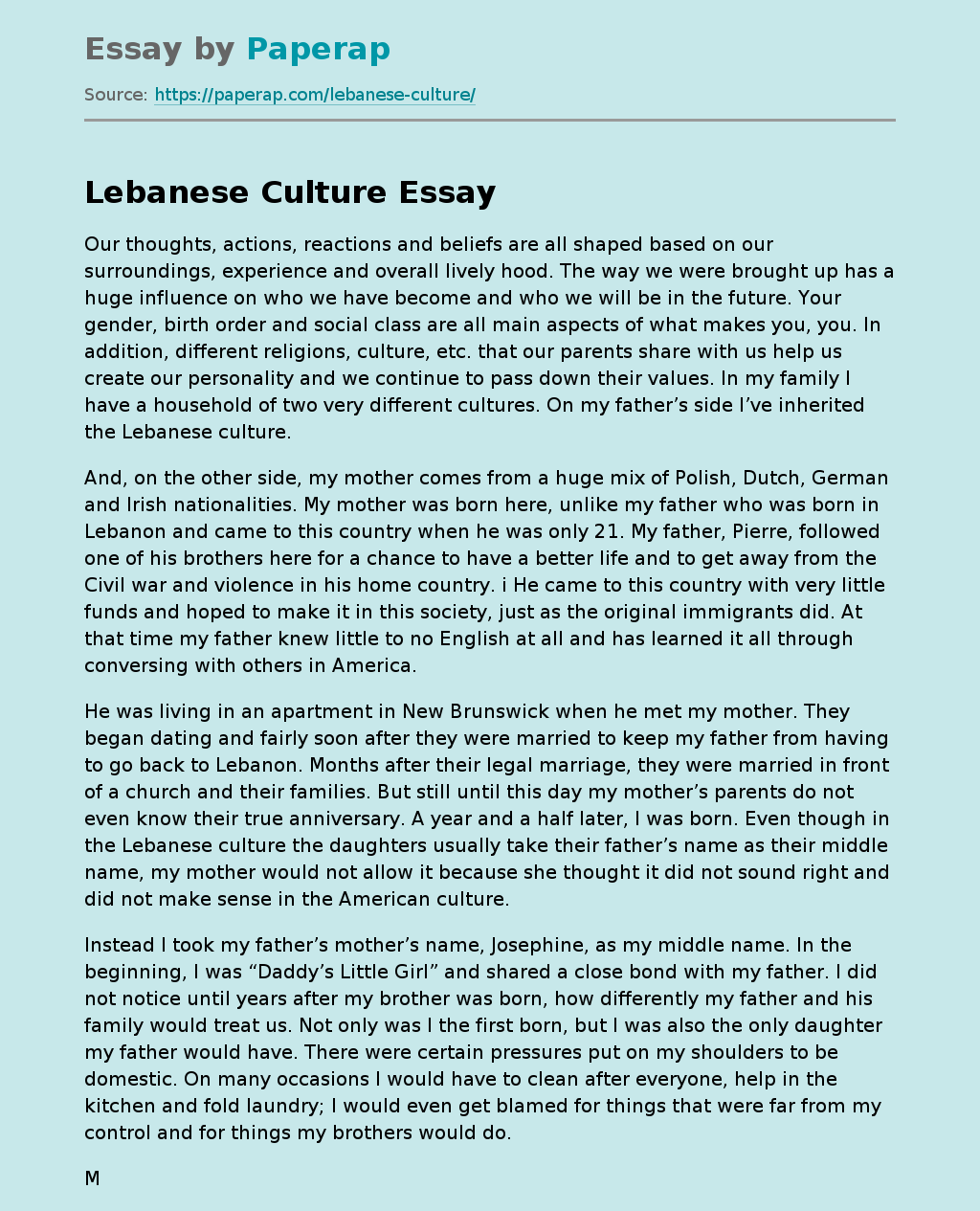Lebanese Culture
Our thoughts, actions, reactions and beliefs are all shaped based on our surroundings, experience and overall lively hood. The way we were brought up has a huge influence on who we have become and who we will be in the future. Your gender, birth order and social class are all main aspects of what makes you, you. In addition, different religions, culture, etc. that our parents share with us help us create our personality and we continue to pass down their values.
In my family I have a household of two very different cultures. On my father’s side I’ve inherited the Lebanese culture.
And, on the other side, my mother comes from a huge mix of Polish, Dutch, German and Irish nationalities. My mother was born here, unlike my father who was born in Lebanon and came to this country when he was only 21. My father, Pierre, followed one of his brothers here for a chance to have a better life and to get away from the Civil war and violence in his home country.
i He came to this country with very little funds and hoped to make it in this society, just as the original immigrants did. At that time my father knew little to no English at all and has learned it all through conversing with others in America.
He was living in an apartment in New Brunswick when he met my mother. They began dating and fairly soon after they were married to keep my father from having to go back to Lebanon.
Months after their legal marriage, they were married in front of a church and their families. But still until this day my mother’s parents do not even know their true anniversary. A year and a half later, I was born. Even though in the Lebanese culture the daughters usually take their father’s name as their middle name, my mother would not allow it because she thought it did not sound right and did not make sense in the American culture.
Instead I took my father’s mother’s name, Josephine, as my middle name. In the beginning, I was “Daddy’s Little Girl” and shared a close bond with my father. I did not notice until years after my brother was born, how differently my father and his family would treat us. Not only was I the first born, but I was also the only daughter my father would have. There were certain pressures put on my shoulders to be domestic. On many occasions I would have to clean after everyone, help in the kitchen and fold laundry; I would even get blamed for things that were far from my control and for things my brothers would do.
My brother on the other hand, had it a little bit easier. He was the first-born son; and in the Lebanese culture they follow the same stereotype of “machismo” for males and expect them to be the provider, aggressive and have more authority over women. ii Thomas, my brother, was seen as “the Golden Child” for many years, and still until this day.
Lebanese males also shared most of the “male role stereotypes” that Doug Cooper Thompson described. They had to “Act Tough, Earn “Big Bucks” or at least work on getting to that successful point, “Get the Right Kind of Job” as a doctor, lawyer, etc., “Compete” and “Win” in anything and everything, including sporting games. iii My father grew up in a time where women did almost anything the men would ask of them.
They would cook, clean and wait on them hand and foot. Women were taught to entertain company, and care after the children; also similar to the “marianismo” term used to describe gender roles of the female in Hispanic cultures. ii Therefore, my father put forth those expectations on me in addition to the expectations of obtaining a proper education to later begin a successful career.
Although there were obvious gender role differences between us we still shared a close bond. We often shared toys whether they were action figures, blocks, Legos, etc. There were often times where we were at the fast food drive-up windows and my mother was asked the same question Ellen J. Reifler expressed, “Is this for a boy or a girl? ” iv However, we would take the “boy toy” and the “girl toy” and combine them together in whatever game we were playing. Or we would take turns playing with his blocks and then move on to playing house with my dolls, similar to Ellen’s son whom she describes at the end of “Time Warp in the Toy Store”.
You might say that we were different because we played with both “boy” and “girl toys” but I believe that it is dependent on whether or not you have a close sibling or cousin of the opposite sex that you play with as a child. Throughout my childhood I was raised more to the Lebanese culture. The Lebanese culture is more dominant and dramatically different than the more Americanized culture my mother carried. My grandmother on my father’s side, whom I can Teta, took care of me very often. In fact, at one point in time in my childhood I only spoke Arabic.
My mother’s mother, whom I call simply grandmom, used to cry to my mother thinking she would never be able to communicate with me. Most of the food prepared and eaten in my house was Lebanese-Mediterranean food, which my mother learned to make. Eating together is very important in the Lebanese culture, it is a way to bring everyone together and there were very few times we did not share a meal together. Overall I think this brought us closer than most families who might choose to sit in front of a television and eat dinner, or all eat on different schedules. In the Lebanese culture, families are extremely close.
Lebanese Culture. (2019, Dec 05). Retrieved from https://paperap.com/lebanese-culture/

